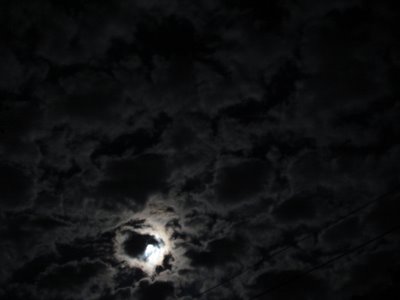More regular than clockwork.

In some things I am utterly predictable. Go back and look: nearly every month, you'll find me trying yet again to get a picture of the full or near-full moon for you. Nearly every month, I end up offering something that's been blurred about by some combination of my tiny tremor and my enormous heartbeat (even when I am holding my breath, as someone wise once suggested I should do...). Here's why I keep trying:
A sky with a moon is a larger thing than itself. Clouds interlacing a moon turn a lawn to a plain. A large sky moon gives the clearest light I know. Even students leaving a seminar, fatigued from their three hours of conversation, will pause to remark it. I tried to make a list of my favorite moon-sightings this evening, and it soon became a list of my favorite places to see the moon, and then started to become a list of all the times I can remember having seen the moon. And then I was stopped, because it was time for dinner and a reading. And by the time the reading had ended, there was another skyscene to add to my list: the moon high and small, the sky flung out broad as a sea. It was a moon for which I could not stop until I was walking alone again; I am still shy, sometimes, about breaking my long stride abruptly and taking pictures in the middle of a conversation. My brain does so many things at once now that I worry I may seem rude. I have become ever more the gatherer.
One gathering this week: yet another translation (David Ferry's) of The Georgics, which mean something entirely different to me now than they did even four months ago, when I read them last. Now, as I read them, I cannot stop reading everything to do with farming as a version of everything to do with the vicissitudes and vagaries of the heart:
Not till the earth has been twice plowed, so twiceAnd the fall makes its own appearance in Virgil's verse:
Exposed to sun and twice to coolness will
It yield what the farmer prays for; then will the barn
Be full to bursting with the gathered grain.
And yet, if the field's unknown and new to us,
Before our plow breaks open the soil at all,
It's necessary to study the ways of the winds
And the changing ways of the skies, and also to know
The history of the planting in that ground,
What crops will prosper there and what will not.
In one place grain grows best, in another, vines;
Another's good for the cultivation of trees;
In still another the grain turns green unbidden. (Georgic I)
How shall I tell of autumn and its changesNo one can tell of all the things to be watched out for. That's the trick and the truth of the matter. And so I watch out for what I can watch out for, and what finds me is that expansive sky with its cool wise moon.
And its changing constellations as the days
Grow shorter than they were, and summer's heat
Grows less than it had been? How shall I tell
Of all the things the farmers must watch out for? (Georgic I)


0 Comments:
Post a Comment
<< Home